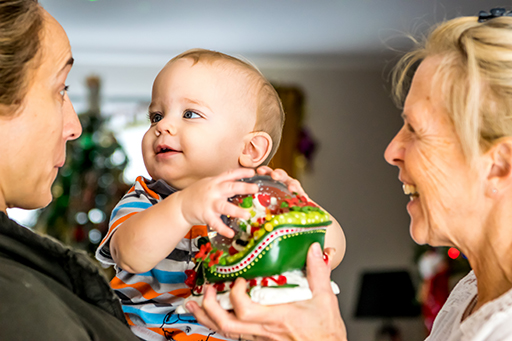4.1 Building relationships
In Week 2 you heard a parent and key worker (or person) talking together about their shared care for a child. Positive relationships between staff and parents make it easier to provide the right support for all children. Developing a positive relationship from the outset can be supported by adopting a flexible and responsive approach.
Most settings have a system of key workers who have a responsibility for developing relationships with children and families. These key staff can be particularly important for children and parents as they start in a new setting. They may become less important over time as children develop their relationships with adults and may make their own choice about who to seek for comfort or support.

The
Activity 4.1 Building relationships to support transition
Read these parents’ accounts of what they found positive about support they received as their child started at a nursery. What was most important to these parents?
‘Having her [key person] come out to the flat was absolutely fantastic – I am convinced that this was a really important part of him coming to understand that he is safe and secure enough to be able to enjoy the environment at the nursery.’
‘Our experience of transition has been one where we have felt fully informed and supported and have very much appreciated the incredibly sensitive, flexible and creative approach which you and [staff member] have taken with George, who we know has been a trickier customer than most.’
‘Marie [staff member] was also good at ensuring that Lewis got to know and spend time with other staff members – particularly Dave [staff member] in the early days, which really helped on the days when Marie [staff member] was in late or not working.’
‘We very much enjoyed having Sian and Lee [both staff] to visit at home before Chloe started and it certainly made a huge difference to Chloe when she began attending the nursery, as she immediately had some “special people” who she knew she could go to. It was also extremely valuable to me to have a chance to get to know the nursery’s key workers and get a feeling for how they would interact with her.
‘The visits never felt rushed, and Sian and Lee took care to take on board the information I gave them about Chloe and to get to know her as an individual, which was reassuring for me. I love that I was able to experience the space and the daily routines like this before leaving Chloe, and I felt that she was fully ready to be left there when it was time for her to start.’
Discussion
Important points raised by parents included:
- staff being flexible and developing bespoke ways of supporting children
- arranging home visits to build relationships with parents and children
- ensuring that other staff build relationships with children early on so that if staff are absent, there are other staff available who know the child
- being able to see the setting and knowing their child’s routine
- being able to access their children’s experiences via an online communication method.
It is interesting to note that one parent perceived that their child needed more support than others to settle in, referring to ‘a trickier customer than most’. It’s important to be aware that parents might be very conscious of their child’s difference to their peers, and may perceive difference negatively – or perhaps worry that they are causing extra work or difficulty.
Having a flexible settling in place that can accommodate all children is important for all parents and children to feel included. It is also important to provide reassurance to parents and children that it is the responsibility of staff to meet each child’s needs and that it is each child’s right to have these needs met.
The comments in the activity above came from a parent survey to explore the role of key workers and to inform the nursery’s approach to supporting transitions.
However, please remember that it may not be usual practice for an ELC practitioner to carry out a home visit. Occasionally home visits may be necessary, but it is important to remember that a risk assessment should be carried out. Where possible, parents should be encouraged to come into the nursery.
Perhaps you could ask parents in your setting for their views on supporting transitions and use what you find to develop your practice?

Next you’ll look at building and respecting identity, and how and when a diagnosis can be helpful.
Introduction
